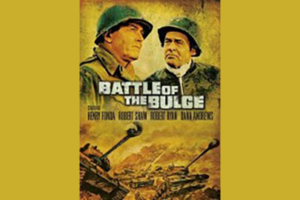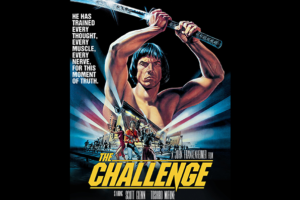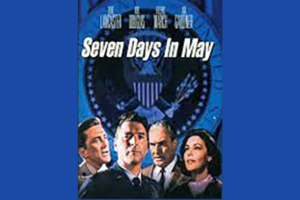
For 30 years, I have been killing and murdering. What have I achieved? Same world. same wars, same enemies, same friends, and same victims.


Today on Classic Movie Review, we are taking on Black Sunday (1977).
I want to thank Rosalind for her comment on Son of Dracula (1943), Anne for comments on Against All Odds (1984), and Chris for his ideas about The Bedford Incident (1965). Special thanks to David R. for his insights into the planes used in The Flight of the Phoenix (1965) and Robert H. for his comments on crime movies.
Of course, I love this movie. I was a young helicopter mechanic stationed in Germany when I saw it. Naturally, helicopters saved the day, so I was all in.
This exciting film has a poor 6.8[1] on iMDB.com. On Rottentomatoes.com, this film has a 71 percent on the Tomatometer and only 65 percent audience approval.[2] Unbelievable!
New York Times film critic Vincent Canby said in an April 1, 1977 review:
“The date is Nov. 12. We know because an opening credit card informs us of this fact and during the rest of John Frankenheimer’s “Black Sunday” more cards are forever telling us dates—Nov. 14, Nov. 17, etc.—as if to suggest that time is running out instead of just running on. … “Black Sunday,” the screen adaptation of Thomas Harris’s best-selling suspense novel, starts in Beirut where members of the Black September, the Arab terrorist group, are plotting to dramatize the Palestinian liberation cause by hitting Americans “where it hurts, where they feel most safe.” Their plan, as we come to learn it, is to kidnap a friendly old Goodyear blimp, load it with high explosives and dartlike shrapnel and send it put-putting over the Miami Super Bowl to assassinate the United States President and 79,999 other football fans. The question is not whether they will succeed as much as how they will fail, and at what last split-second. Though “Black Sunday” is vastly superior to such junk movies as “Airport ’77,” “The Domino Principle” and “Two Minutes Warning,” it belongs to that same category of film so involved with techniques and logistics that even when it generates some awe it is never once surprising.”Black Sunday” is a Disneyland exhibit where people look real but are made out of rubber activated by transistors. It is a superior example of a kind of contemporary film making that has become much less involving and fun as its subjects have become more serious—and you can’t get more serious than Presidential assassination and terrorism on the scale threatened in “Black Sunday.” … The characters don’t motivate the drama in any real way. They are cut and shaped to fit it, and if the cast of “Black Sunday” were not so good, and if Mr. Frankenheimer were a less able director, the movie would be unendurably boring. … Mr. Shaw brings to the role a mixture of tough resolve and weary skepticism that are as much his own contribution as the script’s. Mr. Dern, slimmed down to skeletal proportions, is so convincing as the former prisoner of war who now flies Goodyear blimps that he effectively reminds us of Mr. Frankenheimer’s best film, “The Manchurian Candidate,” though “The Manchurian Candidate” was about brainwashing and politics and “Black Sunday” is about blimps (as much as anything else).[3]
Actors – Black Sunday (1977)
Returning
The great Scottish actor who hunted sharks and played a Nazi, like he was born to the role, Robert Shaw played Israeli Mossad agent Kabakov. This amazing actor was first covered as a Nazi tank commander in Battle of the Bulge (1965).
Bruce Dern played mentally ill pilot and former P.O.W. Lander. He plays a pretty good bad guy, as seen when he was first reviewed in the John Wayne western The Cowboys (1972).
Steven Keats played Mossad agent Robert Moshevsky. This solid actor was first reviewed in the Neo-Noir The Friends of Eddie Coyle (1973).
Clyde Kusatsu had a small role as the Freighter Captain. Kusatsu was first covered in the great martial arts film The Challenge (1982).
New
Marthe Keller played Arab terrorist Dahlia. Keller was born in Switzerland in 1945. As a child, she studied ballet until a skiing accident ended this dream. At the age of 16, Keller switched to acting. Keller worked as a model while she was establishing her acting career. Keller worked in the Berliner Ensemble and Schiller Theatre. She began acting in 1964 and had her first uncredited role in Funeral in Berlin (1966) and later Wild Rider Ltd. (1967). At some point, she attended the Stanislavsky School in Munich.
She worked in France during the 1970s and made A Loser (1972), The Right of the Maddest (1973), and And Now My Love (1974). Her most popular films in America include Marathon Man (1976), I swear I didn’t know that was her, a racing movie, Bobby Deerfield (1977), with Al Pacino, the Billy Wilder romance Fedora (1978), Dark Eyes (1987), and Hereafter (2010)
Keller has remained active on the stage, directed opera since 1999, and is an expert on classical music.
Story – Black Sunday (1977)
It is November 12 in Beirut, Lebanon. A woman, Dahlia Iyad (Marthe Keller), walks through the airport. She is all business. She takes a taxi through the crowded streets of the city. The driver drops her off at a city market. Dahlia uses mirrors to check for followers. A man delivers a message to her, and she continues through the market. Finally, she gets into the backseat of a waiting Mercedes Benz.
Dahlia is taken to a heavily guarded compound. At the compound, she views a film showing an American POW in Vietnam making a video confession to war crimes. The POW is Navy pilot Mike Lander (Bruce Dern).
In the room watching the film are Nageeb (Victor Campos), a Palestinian terrorist, a man credited as a Japanese Man (Robert Ito), and another unidentified man. Since the film came from North Vietnam, I assumed Ito was playing such.
Dahlia wants the film destroyed because she has cultivated Lander as a willing terrorist. She says she can control him, but he is like a child. Dahlia says he will be using 220,000 rifle dots, and the Americans will be struck where it hurts the most. She plans on making a tape for after the attack.
Through the dark waters of the harbor, a strike team of Israeli Mossad agents paddles toward the shore in brightly colored inflatable rafts. The team is led by Major David Kabakov (Robert Shaw) and his second in command, Robert Moshevsky (Steven Keats). Their agent on the shore loads the strike team into a Volkwagon Bus, the universal symbol of peace. So you have an Israeli team riding in a German car, going to kill Palestinians, who were displaced when the Jews migrated to Israel, following the Nazis trying to exterminate them.
Back at the Palestinian compound, the “Japanese man” asks about Lander obtaining the rifle dots. He then gives her a statue of the Virgin Mary, which is really plastic explosives. He says the rest of the shipment will arrive within ten days, and they will have no problem making their January 9 deadline.
She goes to make the tape as the strike team gets closer. On the tape, Dahlia says that America will share the Palastiain’s suffering. Later it appears that Nageeb and Dahlia have made love. She goes to the shower as the silent attack begins.
The strike team kills the outer guards before entering the compound. They speed through the halls, killing, collecting information, and setting analog timebombs. Kabakov breaks into the bedroom, where he kills Nageeb. Kabakov then breaks into the shower. He sees the nude Dahlia and decides not to kill her, thinking she is a prostitute.
The strike team makes it out of the exploding house with Dahlia’s recording. She also survives the attack.
On November 14 in Los Angeles, Lander is flying the Goodyear blimp over a pro football game. The camera crew orders the blimp to the other side of the field, but Lander cannot move the blimp because of the prevailing winds. The leader of the camera crew is angry, but the co-pilot assures him that Lander is the only one that would try to fly in these conditions.
On November 17, F.B.I. agent Sam Corley (Fritz Weaver) is called to the Israeli embassy in Washington to meet with Kabakov and Moshevsky. Kabakov plays the tape and then gives insights into Black September. The tape confirms that the attack will occur in the New Year, but they have no idea of the target. Kabakov admits that he should have killed Dahlia, now knowing that she is part of the plot.
Also, on November 17, Dahlia arrives at Lander’s home in Los Angeles. The house is dark, and Lander is having a psychotic break as Dahlia is three days late returning from her trip. He holds her at bay with a shotgun, but she is able to talk him down. Dahlia gives him the plastic explosive Madonna, and he calms down. Lander recognizes the explosives as North Vietnamese. Dahlia gets undressed and tells Lander that 600 kilos of explosives are coming in by ship.
In the morning, Lander is in an upcycle and is up early working on the mold for the project. He has another machine that he plans to use for a test. Dahlia reminds Lander to attend his Veterans Administration appointment so he can keep flying. However, he does not want to go.
At the V.A., he is made to spend the entire day waiting for his number to be called. The bureaucrats that work there are cold and unsympathetic. When he finally sees the doctor, the man knows nothing about his case. His wife was fooling around while he was a P.O.W. and divorced him shortly after his return.
Dahlia goes to see an importer Muzi (Michael V. Gazzo), who has been paid $100,000 to get the shipment on the ship.
Kabakov and Moshevsky continue to search for the identity of Dahlia.
Late at night on November 23, Dahlia and Lander take a small boat out to a freighter in Long Beach Harbor. The Freighter Captain (Clyde Kusatsu) gets the explosives loaded into the speedboat. As they are leaving, a Coast Guard ship begins to pursue them. Lander loses the Coast Guard cutter because his boat is faster and lower in the water. He escaped by going under a very low drawbridge. Because of the alert, the incident is reported to the F.B.I.
F.B.I. agent Corley, Kabakov, and Moshevsky interview the Freighter Captain and Muzi, who denies knowledge of the shipment. Lander is disguised as a phone repairman and is stringing wire from the ship. The Lybian ship owner helps protect the Captain and the ship.
That night Kabakov and Moshevsky sneak aboard the ship. They tell the Captain that they will slit his throat if he doesn’t tell the truth. The Captain confesses that a man and woman picked up twelve crates from the ship. He says they were wearing masks, and he can’t identify them. He says the money came from Hong Kong and then Tripoli. The phone in the cabin rings, and the Captain answers it. When he does, the receiver explodes, decapitating him. Kabakov is also injured.
Lander is back at his house surrounded by plastic explosive Madonna statues. When Dahlia sees that an Israeli agent is in the hospital, she gets the idea to finish him off. In the hospital, Kabakov’s tattoo from the Nazi death camp is shown.
Dahlia dresses like a Catholic nurse and enters the hospital. Dahlia fixes a syringe with potassium chloride. Corley gives Kabakov and Moshevsky a warning to not use excessive methods in the U.S.A. Later, Kabakov confesses that he feels beaten and needs to be put down like an old war dog.
Moshevsky sees Dahlia in the hallway and orders her to be identified at the nurse’s station. On the elevator ride down, Dahlia stabs Moshevsky in the neck, killing him. Kabakov is safe, being saved by the actions of his friend.
Kabakov leaves the hospital and gets Moshevsky’s body loaded onto a plane for home. Kabakov then goes to see importer Muzi. He holds a gun on Muzi and demands to know the truth. Muzi tells that the crates contained plastic explosives, the woman identified herself as Kaza, and he was paid by an Egyptian in Tripoli.
Lander and Dahlia fly to a quiet Mojave Desert airstrip. The date is December 3. Lander tells the security guard that they are going to buy the airport but need to take some pictures first. Lander sets up his test bomb and gets the security guard to pose by an aircraft. Lander sets off the bomb killing the guard and putting a perfectly shaped pattern of holes in the old hanger. Lander admires his work as Dahlia wants to leave immediately. Lander says the blast will do tremendous damage at the 50-yard line after being fired from the Goodyear blimp at 100-feet. They will both die in the attack. They burn the hanger as they leave.
Kabakov meets Egyptian Colonel Riaf (Walter Gotel) in Washington. Kavakov says that he needs the help because the attack will be bad for both of their causes. He asks for a picture of the woman from the tape.
Lander continues to work on the giant bomb and its carrying gondola. It is in the shape of a boat hull, so it will radiate outward.
A few days later, Riaf tells that the woman is Dahlia and is of German/Arab origin and has suffered due to the settlement in Palestine. He gives Kabakov a photograph of Dahlia.
On December 31, in Miami, Dahlia tows the boat-shaped bomb through the city before placing it in storage. When Dahlia checks into her hotel, she is approached by a Palestinian agent Mohammed Fasil (Bekim Fehmiu). He tells her that she has been identified and needs to abort the mission. He blames her for making the tape. Of course, she refuses to stop.
On January 1, Corley and Kabakov received notification that Dahlia had been seen in Miami. Fasil is said to have planned the Munich Olympic attack. When they get to Miami, Dahlia has already returned to Los Angeles. They try to capture Fasil, but it turns into a running gun battle. Finally, Kabakov shoots Fasil in the beach surf.
When the agents check the room, they find a magazine about the Orange Bowl. Kabakov, not understanding America, wants the authorities to cancel Super Bowl X, which is scheduled for January 18. Planners let the F.B.I. and Mossad agents know that the President of the United States would be in attendance at the game.
All flights except police helicopters and the Goodyear blimp are canceled the day before the game.
On January 17, Lander gets notified that he will not be flying on game day and is being replaced by Farley (Tom McFadden). Lander has a breakdown, but after a minor breakdown, Dahlia says she will take care of everything.
Corley and Kabakov interview the blimp flight and ground crews.
On January 8, Lander and Dahlia check into a hotel in Miami. Dahlia gets Farley’s room number. She goes to the room and shoots Farley. She hangs a do not disturb sign on the door and cancels his wake-up call.
Corley makes sure all of the security precautions are undertaken.
Lander goes to the blimp crew on game day and tells them that Farley is sick and will not be flying. The first part of the flight goes well, but Lander forces one of the engines to overheat, resulting in an emergency landing.
The Superbowl is the Steelers versus the Cowboys and the film contains actual shots of the team and the game. The movie slows a bit at this point.
A bellhop finds Farley’s body in the hotel room. Corley and Kabakov get the word about the murder and now know the blimp is the attack platform. Kabakov finds out that the blimp is heading back to its field.
Dahlia tows the bomb gondola to the airfield. They tell the ground crew that the network wants the gondola attached to the bottom of the blimp. When a crew member tries to double-check, Lander follows and kills him.
Lander and Dahlia kill the rest of the crew and some F.B.I. agents. They begin throwing out everything they can to make the blimp light enough to fly with the added weight of the bomb. Dahlia kills a bunch more police with a machinegun.
Kabakov and Corley arrive at the airfield and commandeer a two-engine Huey helicopter so they can follow the blimp. They keep the helicopter in the blindspot of the blimp. Lander heads the blimp towards the game. Dahlia opens fire on anything that comes near them. She shoots down one police Kiowa helicopter.
Dahlia wounds Corley when their helicopter gets close to the blimp, trying to kill the pilot. Kabakov has the helicopter head in again. He shoots, killing Dahlia without hesitation and wounding Lander this time.
Lander lights the backup fuse for the bomb and has the blimp on course for the stadium. Kabakov slides down the cargo hook from the helicopter and lands on the blimp’s top. He spends a long time on the blimp, slipping and sliding before getting the hook attached to the helicopter.
The blimp makes it to the stadium, and panic ensues.
The rotary-wing pilot gives it all she’s got and lifts the blimp out over the ocean, where the bomb harmlessly fires into the water. Kabakov flies to safety on the cargo hook after the blimp is released.
Conclusion – Black Sunday (1977)
This movie played on themes that were established by the Munich Olympic massacre. The attack took place in 1972, when Black September, a Palestinian group, attacked the Israeli Olympic team. Black September was formed in Jordan and was a breakaway from the P.L.O.
In the attack in 1972, nine total Israelis were killed, five of the eight Black September members were killed, as was a West German policeman. Black September was associated with the Baader–Meinhof Gang, a Communist cell in West Germany. The gang was supported by the East German ruling communist party.
When I was stationed in Germany, they would place posters in the gas stations with about 20 mugshots of Baader–Meinhof gang members. A dark line would be drawn through the picture as they were captured. When most members were killed or captured, they would release a new poster with the next most wanted group.

Marthe Keller wore a version of the smokey eyeshadow look during this film. It had the effect of making her look determined and single-minded. It was also used to good effect, showing fear and anger.
This makeup style may go back to the ancient Egyptians. This makeup style goes at least as far back as Theda Bara in film. I like that this movie dressed Marthe Keller like a middle-aged housewife. They took pains not to glamorize her.
The director and screenwriter worked very hard on their allegories and relationships. I mentioned a few in the story section, such as the Israeli commandos traveling in a Volkswagon bus, made by Germans, to kill people that were displaced by another people fleeing from Germany’s attempts to eradicate them. Also, the plastic explosives were designed as Madonna statues, the symbol of peace.
Also, they showed the ridiculousness of political connections. Japanese, maybe North Vietnam, made the projectile for the bomb. The North Vietnamese made the plastic explosives and shipped them out of Hong Kong, which was controlled by Great Britain. An Arabic exporter arranged customs for an Asian ship captain to bring them in on a liner owned by Lybians.
Watch it for an exciting good time, where the good guys win.
World-Famous Short Summary – I hate the Dallas Cowboys
Beware the moors.
[1] https://www.imdb.com/title/tt0075765/
[2] Black Sunday – Rotten Tomatoes
[3] https://www.nytimes.com/1977/04/01/archives/screen-terror-over-the-super-bowl.html










Leave a Reply
Your email is safe with us.